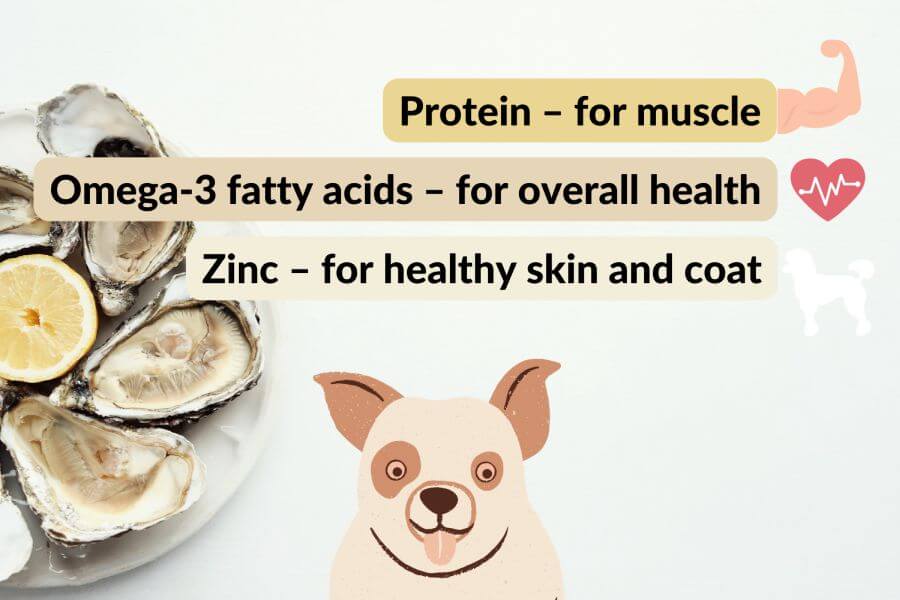Key Takeaways
- Yes, oysters are a fine snack for dogs 🦪✔️
- Remove the shells and cook the meat before tossing to your pooch as a fancy treat! 🍳
- Raw oysters are risky, even if they’re sold as safe for people ⚠️
- Watch out for seafood allergies and seasonings that are toxic to dogs (e.g., onions, garlic and lemon juice) ✔️
Can Dogs Eat Oysters in General?
Yes, as they aren’t inherently toxic – they’re built similarly to other seafood and fish. But that doesn’t mean you should leave your dog alone with an XXL pack of oysters. You need to know that:
- Your pet could choke on the shells.
- If they eat too many oysters, they may vomit them up later or have diarrhea.
- Raw oysters can be contaminated with Vibrio, a bacterium causing vibriosis.
Also, oysters can accumulate domoic acid, which causes amnesic shellfish poisoning if ingested in large amounts. However, they usually contain less of this toxin than mussels do. So can dogs eat oysters? Generally yes, as long as they’re properly cooked and bought from a reputable source.
Health Benefits of Oysters for Dogs
Oysters are a good source of easily digestible protein. They also contain omega-3 fatty acids, which are beneficial for your dog’s health. Oysters can help:
- improve joint health;
- promote a healthy skin and coat; and
- support cognitive function.

If your dog enjoys oysters, it’s OK to let them eat this seafood in moderation, but serve them with caution. Monitor your dog for any signs of toxicity after they’ve eaten oysters. And don’t give them too many – if you’re having 6 oysters yourself, aim for 1–3 for your dog.
Can Dogs Eat Oysters From a Can?
Dogs can eat smoked, pickled and canned oysters, but don’t feed them too many. They can be high in sodium, though they’re still healthier than fried oysters. So, can dogs eat oysters that are canned? Yes, but only one or two as an occasional snack.
When Shouldn’t Dogs Eat Oysters?
First of all, if your dog is chronically ill (be it liver disease, kidney disease, or pancreatitis), they may not be able to eat oysters safely – confirm this with your vet. Second, if Fido’s tummy is sensitive or he’s allergic to seafood, don’t give him any.

If They Contain Harmful Additives
Can dogs eat oysters? Yes, but if you want your dog to try them, make sure that there are no other ingredients that may harm their health. These include:
- lemon juice;
- spicy dressings;
- onions;
- garlic.
If They’ve Already Had Some Recently
You can feed your dog an oyster from time to time as a snack, but don’t overdo it. They’ll still get enough omega-3 fatty acids from their normal diet if you limit the seafood treats to once a week or so.
If You Suspect a Seafood Allergy
Not every dog is the same – some can munch on shrimp and oysters with no worry in the world, while others will need to go to the pet hospital after just one bite. Even if seafood equals healthy in your mind, remember that you should always monitor your dog’s reaction to new food.
If They Don’t Like Oysters
Not all dogs will drool at the sight of a slimy, smelly oyster. Some don’t like them at all! If all they want is regular dog treats, respect their taste.
Frequently Asked Questions
Can Raw Oysters Hurt Dogs?
Yes – the shell can cut their mouth, and the meat can give them a nasty bacterial infection. That being said, if the oyster is deemed safe for human consumption, it shouldn’t harm a dog either.
Are Dogs Allergic to Oysters?
The proteins in oysters are usually beneficial for dogs, and adverse reactions are more likely due to other ingredients in the dish rather than the oysters themselves. However, some dogs do have seafood allergies, which unfortunately also excludes oysters from their list of snacks.
What Seafood Can Dogs Eat?
Shrimp, salmon, and cod are the best seafood you could possibly offer your pooch. Note that some seafood – such as carnivorous fish – accumulates mercury. This isn’t a problem if it’s a rare treat, but might be if you swap out entire meals of dog food for it.
Similar Posts:
- Can Dogs Eat Lobster?
- Can Dogs Eat Hummus? It’s Not Just Chickpeas
- Can Dogs Eat Crab? Everything You Need to Know
- Can Dogs Eat Lemons? Are Citrus Fruit Bad for Dogs?
- Can Dogs Eat Scallops? Are Fried Scallops and Raw Scallops Safe for Dogs?
- Can Dogs Eat Jackfruit?
- Can Dogs Eat Guacamole? Avocado & Your Dog 🥑🐶
- Can Dogs Eat Shrimp? | The Beloved Seafood and Dogs

